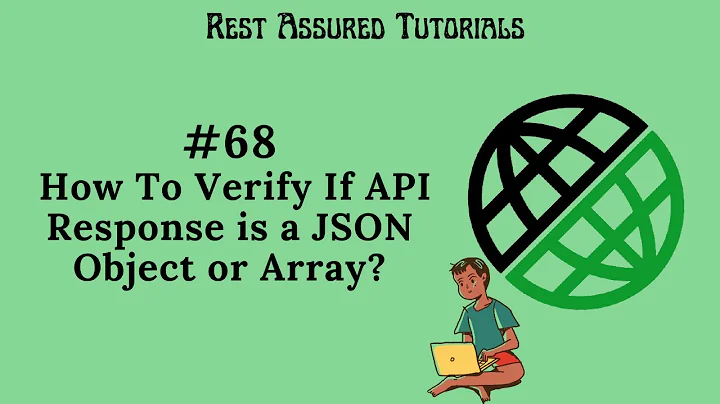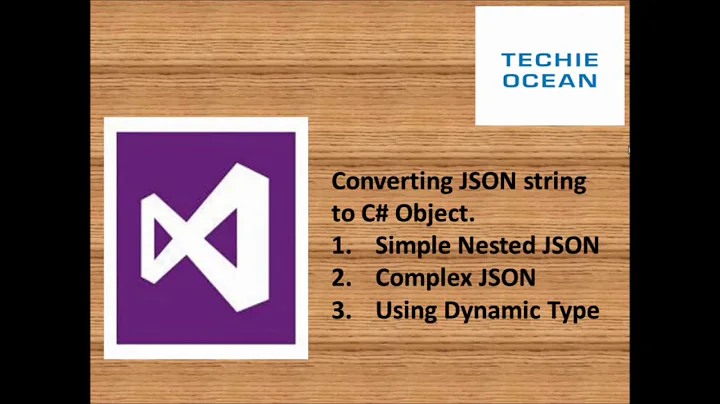How to return a Json object from a C# method
Solution 1
resp is already a JSON string, but it is not valid JSON (the keys are not wrapped in quotes ("). If it is returned to angular, the JavaScript JSON.parse() method is unable to deserialize it. However, you can use JSON.NET in deserialize it to a JObject and serialize it again into valid JSON and create your own HttpResponseMessage...
public HttpResponseMessage Get()
{
string userid = UrlUtil.getParam(this, "userid", "");
string pwd = UrlUtil.getParam(this, "pwd", "" );
string resp = DynAggrClientAPI.openSession(userid, pwd);
var jObject = JObject.Parse(resp);
var response = Request.CreateResponse(HttpStatusCode.OK);
response.Content = new StringContent(jObject.ToString(), Encoding.UTF8, "application/json");
return response;
}
Or you can just return the JObject and have Web API serialize it for you...
public JObject Get()
{
string userid = UrlUtil.getParam(this, "userid", "");
string pwd = UrlUtil.getParam(this, "pwd", "" );
string resp = DynAggrClientAPI.openSession(userid, pwd);
var jObject = JObject.Parse(resp);
return jObject;
}
In either case, the Web API call should return this JSON, which is now valid...
{
"status": "SUCCESS",
"data": [
"4eb97d2c6729df98206cf214874ac1757649839fe4e24c51d21d"
]
}
In the angular code, you'd have to dig out the session id which is stored in an array called data...
userService.openUserSession(rzEnvJson).then(function (response) {
var sessionResponse = response.data; // or simply response, depending if this is a promise returned from $http
$rootScope.rgSessionVars.sessionID = sessionResponse.data[0];
});
Solution 2
The key to what is going on here is in the comment made by Mike Cheel; serialization is happening twice, once in the OP's code and once by Asp.Net WebAPI. That is why a string is returned instead of a Json object.
I was encountering the exact same thing. Here is a hello world example showing the problem. I first did something like this:
[Route("getall")]
public string GetAllItems()
{
var result = new
{
x = "hello",
y = "world"
};
return JsonConvert.SerializeObject(result);
}
I then tried to so something like this, thinking that I needed to return IHttpActionResult to resolve this:
[Route("getall")]
public IHttpActionResult GetAllItems()
{
var result = new
{
x = "hello",
y = "world"
};
return Ok(JsonConvert.SerializeObject(result));
}
Both these controller actions gave me a string rather than the Json object that I was wanting; so I go this:
"{\"x\":\"hello\",\"y\":\"world\"}"
Finally I saw the comment by Mike and realized that I needed to return the .Net object directly and just let WebAPI handle the serialization. So instead of returning this:
return Ok(JsonConvert.SerializeObject(result));
return this:
return Ok(result);
Then I got the result that I was expecting:
{"x":"hello","y":"world"}
Solution 3
I don't see what this has to do with AngularJS, but your problem is simple. Your data object is JSON encoded. So you could almost certainly access data.JsonRequestBehavior and it would be 1. But your Data field inside it is AGAIN JSON-encoded. You need to decode it before trying to use it - it's just a string when you get to this callback:
var myData = angular.fromJson(data.Data);
console.log(myData.data);
Note that your data.Data object is itself another wrapper - an array. You almost certainly want myData.data[0] to go into that sessionID field...
Related videos on Youtube
bob.mazzo
Front-end Developer with full stack experience in c# and Sql Server, working in norther NJ. Current technologies include Angular, Html/JavaScript/CSS, Kendo UI, Angular-Material, Web Api. I'm married with two boys, play piano at church, and do some gigs on the side. I love soccer (Brazil, Man City) - and enjoying training with my kids, and playing with the guys at work. [email protected]
Updated on August 24, 2021Comments
-
 bob.mazzo over 2 years
bob.mazzo over 2 yearsI am trying to fix an ASP.NET WebAPI method where a Json response is required. However it's returning a string instead.
Initially it was returing XML format, but I've added this line to the mvc code in App_Start\WebApiConfig.cs in order to return Json by default.
config.Formatters.Remove(config.Formatters.XmlFormatter);We've updated the c# method as follows to use NewtonSoft:
public string Get() { string userid = UrlUtil.getParam(this, "userid", ""); string pwd = UrlUtil.getParam(this, "pwd", ""); string resp = DynAggrClientAPI.openSession(userid, pwd); JsonSerializer ser = new JsonSerializer(); string jsonresp = JsonConvert.SerializeObject(resp); return resp; }The resp var is coming back as a string type:
"{status:\"SUCCESS\",data:[\"4eb97d2c6729df98206cf214874ac1757649839fe4e24c51d21d\"]}"and jsonresp var looks like this :
"\"{status:\\\"SUCCESS\\\",data:[\\\"4eb97d2c6729df98206cf214874ac1757649839fe4e24c51d21d\\\"]}\""and in Chrome's F12 dev tools, the data object is :
""{status:\"SUCCESS\",data:[\"4eb97d2c6729df98206cf214874ac1757649839fe4e24c51d21d\"]}""and in Console tools, the result of angular.fromJson(data) :
"{status:"SUCCESS",data:["4eb97d2c6729df98206cf214874ac1757649839fe4e24c51d21d"]}"I would appreciate some advice on how to properly return the Json object, and NOT in any string type.
UPDATE
By intercepting the
respvar, and using Mr. Chu's suggestion below, I can successfully achieve a nice clean Json object on the client. The key is thatrespneeds to contains double quotes around both key:value pairs:public HttpResponseMessage Get() { string userid = UrlUtil.getParam(this, "userid", ""); string pwd = UrlUtil.getParam(this, "pwd", ""); string resp = DynAggrClientAPI.openSession(userid, pwd); resp = "{\"status\":\"SUCCESS\",\"data\":[\"194f66366a6dee8738428bf1d730691a9babb77920ec9dfa06cf\"]}"; // TEST !!!!! var response = Request.CreateResponse(HttpStatusCode.OK); response.Content = new StringContent(resp, System.Text.Encoding.UTF8, "application/json"); return response; }in Chrome console, the response is :
Object {status: "SUCCESS", data: Array[1]} data: Array[1] status: "SUCCESS" __proto__: Object-
Anthony Chu almost 10 yearsWhat is
resp? Is it a JSON string? -
 Mike Cheel almost 10 yearsWebApi will convert it to JSON for you automatically (assuming you have it set up properly). Don't convert it to JSON and try just returning the C# object.
Mike Cheel almost 10 yearsWebApi will convert it to JSON for you automatically (assuming you have it set up properly). Don't convert it to JSON and try just returning the C# object.
-
-
Chad Robinson almost 10 yearsPS, this is all probably happening because you're doing
string resp = DynAggrClientAPI.openSession( userid, pwd );and taking the result as a string. You didn't include code for it, but if you have this return a real object, your JSON encoder can probably avoid the double-encoding and let you skip the step above. -
 bob.mazzo almost 10 yearsI've updated my original post to show the change - now using NewtonSoft's JsonConvert.SerializeObject.
bob.mazzo almost 10 yearsI've updated my original post to show the change - now using NewtonSoft's JsonConvert.SerializeObject. -
Anthony Chu almost 10 yearsHave you tried this answer? Seems like it should do what you want.
-
 bob.mazzo almost 10 yearsI'm getting a front end error: "SyntaxError: Unexpected token s at Object.parse (native)"
bob.mazzo almost 10 yearsI'm getting a front end error: "SyntaxError: Unexpected token s at Object.parse (native)" -
 bob.mazzo almost 10 yearsthe 'resp' var is indeed the source of contention here. It's a C++ program that return this. I will need that coder to return some kind of Json-formatted object, I assume.
bob.mazzo almost 10 yearsthe 'resp' var is indeed the source of contention here. It's a C++ program that return this. I will need that coder to return some kind of Json-formatted object, I assume. -
 bob.mazzo almost 10 yearswe've updated the code to use JsonSerializer(). My data result is now coming back as ""{status:\"SUCCESS\",data:[\"9f9502cd3e0a81cab3b2c7b4fc65395b0b40741130c7aead498a\"]}""
bob.mazzo almost 10 yearswe've updated the code to use JsonSerializer(). My data result is now coming back as ""{status:\"SUCCESS\",data:[\"9f9502cd3e0a81cab3b2c7b4fc65395b0b40741130c7aead498a\"]}"" -
 bob.mazzo almost 10 yearsin the meantime, I'm pulling out the data: field by first applying JSON.parse(data) then using the .split() function to access the data: field. It's not ideal, but works in the meantime.
bob.mazzo almost 10 yearsin the meantime, I'm pulling out the data: field by first applying JSON.parse(data) then using the .split() function to access the data: field. It's not ideal, but works in the meantime. -
Anthony Chu almost 10 yearsIt looks like
respcontains invalid JSON.statusanddatashould be wrapped in"s. Thesthat the error is complaining about is thesinstatus. -
Anthony Chu almost 10 years@bob I've updated my answer to show how you can use JSON.NET to convert the invalid JSON from
DynAggrClientAPI.openSessioninto valid JSON and return it to Angular. -
 bob.mazzo almost 10 yearsI've updated my original post to reflect your new code, as well as manually intercepting the
bob.mazzo almost 10 yearsI've updated my original post to reflect your new code, as well as manually intercepting therespvar which re-formats the string with double quotes. My c++ guy will fix that part. -
 bob.mazzo almost 10 yearsanthony, I've also tried your JObject idea, and it also works like a charm against the invalid Json string.
bob.mazzo almost 10 yearsanthony, I've also tried your JObject idea, and it also works like a charm against the invalid Json string. -
Harshal over 7 yearspublic JObject Get() methods works for me, Thank you so much
-
StackOverflowUser about 4 yearsI know you found that return Ok(JsonConvert.SerializeObject(result)); was causing an issue. I'm just glad you posted that code because that code was what SOLVED the issue I was having.









![Serialize and Deserialize Json to C# [Step By Step Tutorial of JSON in C#]](https://i.ytimg.com/vi/hLYHE1kIOpo/hq720.jpg?sqp=-oaymwEcCNAFEJQDSFXyq4qpAw4IARUAAIhCGAFwAcABBg==&rs=AOn4CLCwFkI7YDaizcmvb-xMAdIPTDYX-A)
